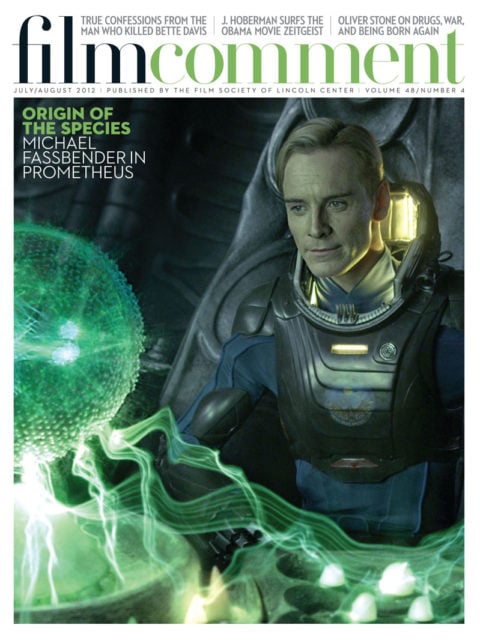It doesn’t hurt to restate the obvious: relativism and contingency are two things that have to be reckoned with when evaluating a festival. The work on offer may be good, bad, or indifferent, but perhaps only relatively speaking. In a bad festival year, halfway decent work can look revelatory in May but seem irrelevant by year’s end, and in a good year, a minor film by a major filmmaker may disappoint at Cannes and yet dwarf most of what you’ll see during the next seven months. Almodóvar’s last three films in the Cannes Competition were lesser works and since he’s capable of much better, it’s conceivable—isn’t it?—that the festival might have passed them by. But then again, compared to everything else I saw over the same period, who could deny all three were of a relatively high caliber?

Post Tenebras Lux
You can disparage the people who chose a festival’s films till the cows come home— for their lack of taste or judgment, for selling out, for playing safe, for playing favorites, for being out of touch, for being calculating, and so on. And I should know, having shamelessly grumbled about festivals for the past 20 years and done my share of programming as well. But maybe in the end it all just comes down to one word: luck.
Were they—and we—lucky this year? Did they look in the right places? Did they listen to the right people? Were the filmmakers ready? And if they were, did they deliver? And if they weren’t or they didn’t— then what? (That’s when taste and judgment come into play, assuming the programmers have at least a modicum of each.)
In this year’s Competition, Haneke and Mungiu delivered in no uncertain terms, as did Resnais, and these films would have been indisputably great regardless of what surrounded them. So far so lucky. Close behind, Carlos Reygadas, with Post Tenebras Lux, productively changed tack in terms of material (the marital problems of a middleclass couple who have relocated to the hinterlands where the natives are restless) and style (exquisitely beautiful and hallucinatory visuals)—although he couldn’t resist including another of his requisite interludes of unappetizing sex. Sergei Loznitsa’s behindenemy- lines World War II drama In the Fog, in which a stoic man suspected of collaboration finds himself trapped in the wilds with the two Soviet partisans charged with executing him, quietly casts a spell, is often masterfully directed, and was Competitionworthy enough, but it breaks no new ground and falls well short of the director’s My Joy, a highlight of Cannes 2010.

In the Fog
Risk-taking is another part of the festival equation, and while most serious filmmakers probably feel they’re taking a risk of one kind or another every time they go up to bat, those that truly do ought to earn points even when it doesn’t pay off. By general agreement it did for Leos Carax, hands down the biggest risk-taker this year—and though to me it seemed barely there as a film, his Holy Motors was met with widespread approval and inspired smart critical readings from discriminating viewers across the critical spectrum. Mostly, the Competition films played it safe: Hong Sang-soo’s agreeable and slight In Another Country runs a cross-cultural variation on his trademark format, the mischievously structured miniature of mutual incomprehension. Jacques Audiard slums it again with the watchable and entirely disposable melodrama Rust and Bone, which didn’t measure up to A Prophet but holds the attention thanks to Belgian actor Matthias Schoenaerts’s performance—even though it’s more or less a reprise of his turn in last year’s Bullhead. (Audiard knows a good thing when he sees it.) Ken Loach’s Jury Prize–winning The Angel’s Share, another down-to-earth look at youth without prospects that offsets the bad news with slightly forced comic relief, is utterly routine— if only Loach would give his perennial screenwriter Paul Laverty a rest and shake things up a bit.
In striking contrast to last year, all 22 of this year’s Competition directors were firmly established if not preeminent—10 of them had previously won prizes at Cannes, and 17 had previously been in the Competition. (None were women, as was much noted, but the same was true in 2010, 2005, 1999, and 1998—it was just bad luck that Naomi Kawase didn’t have anything this year, I’m guessing.) By these criteria (well-known, previously in competition, male) Ulrich Seidl deserved his slot with Paradise: Love, in which he once again serves up a chilly, poker-faced chronicle of everyday abjection, here by playing out the mutual exploitation of an aging would-be sex tourist and her young male escorts at a Kenyan beach resort. I realize Seidl’s some sort of national treasure to Austrians, but his reliance on deliberate compositions and an unflinching but removed gaze only gets you so far. The same might apply to Abbas Kiarostami’s Like Someone in Love, whose more traditional spring-autumn escort-client configuration is played for what crumbs of ambiguity are to be had in a bid to repeat Certified Copy’s trick (no pun intended) in Tokyo. The urban locale brings a measure of freshness to the prolonged scenes unfolding in car interiors that are the increasingly cosmopolitan director’s favorite gambit—but isn’t he running on empty, and hasn’t exile amplified the aimless quality his filmmaking has assumed since Ten? Gomorrah director Matteo Garrone’s Reality sustains an engaging virtuoso energy as its protagonist becomes increasingly consumed with his obsession to be selected as a contestant on Big Brother, but with its firm grasp of the obvious, the trite insights of this update of Visconti’s Bellissima for the age of reality television are at least 10 years too late.
A couple of Competition alumni made comebacks just when they seemed poised to be permanently consigned to third-tier status in the world-cinema hierarchy. Aided by strong performances, Walter Salles’s On the Road brought a fairly lucid approach to Jack Kerouac’s novel, and remained engaging even when, in order to solve the adaptation impasse, the screenplay resorted to conflating Kerouac’s characters with their real-life models, concluding with Sal Paradise overcoming his disillusion with Neal Cassady—er, make that Dean Moriarty— and triumphantly writing (or is that typing?) the book upon which the film you’re watching is supposed to be based. And with The Hunt, Thomas Vinterberg, who used to be the shape of things to come back in 1998, returned to the subject of child abuse and stricken masculinity with a surefire if standard-issue wrong-man scenario that landed the estimable Mads Mikkelsen the best actor prize. In leaving absolutely no stone unturned, Vinterberg predictably polarized opinion according to how you feel about being subjected to the manipulations inherent in conventional persecution narratives. (I generally go with it but resent the film afterward.)

Hold Back
If you have the impression that I’m less than enthusiastic about the above Competition films, you’re not mistaken, so I’ll pass over the merely tepid (Yousry Nasrallah’s After the Battle, David Cronenberg’s Cosmopolis) and the four out of five American entries (two of them directed by Australians) that were perfectly mediocre without comment. In addition, Un Certain Regard yielded the usual one or two discoveries, plus a couple of strong efforts by name directors (Darezhan Omirbayev, Joachim Lafosse) inexplicably not deemed Competition-worthy. However, for the first time I can remember, 50 percent of the section was comprised of well-or somewhatknown directors, leaving only 10 slots for what used to be the section’s staple, unfamiliar newcomers—the majority of whom are destined never to be heard of again, it has to be said. (I hope we do hear more from Indian director Ashim Ahluwalia, whose lively, fast-and-loose Miss Lovely, about two brothers toiling in the world of Bollywood B-movie and softcore porn production in the Eighties, had an off-kilter, at times delirious first hour and then settled into a pungent story of jealousy, betrayal, and doomed love.) Finally, for the first time in 15 years the Directors’ Fortnight and the Critics’ Week sidebars failed to offset the deficiencies of the main festival. Critics’ Week was a total bust in contrast to last year’s strong lineup, while most of the Quinzaine highlights were minor and tame albeit often very likeable films from familiar faces—Pablo Larraín (No), Ben Wheatley (Sightseers), Michel Gondry (The We and the I), Quinzaine prize-winner Noémie Lvovsky (Camille Rewinds), and the late Raúl Ruiz (Night Across the Street). If there was one discovery, it was the scrappy French low-budget indie Hold Back by Rachid Djaïdani, an unassuming contemporary Paris-set Romeo and Juliet story about taboo interracial love—he’s black, she’s Arab, and tradition (and her brothers) dictate that never the twain shall meet by any means necessary.
Even those who liked more films than I (i.e., almost everyone I know) agreed that Cannes had… an unlucky year. The million-dollar question is: did the festival have any better options? When it comes to the weak American showing, it’s safe to surmise that it’s not just the tyranny of the red carpet that dictated the choices. But for the bad luck that P.T. Anderson’s The Master (in postproduction since last September), Derek Cianfrance’s The Place Beyond the Pines (ditto), David Siegel and Scott McGehee’s What Maisie Knew (in post since last October), Terrence Malick’s To the Wonder, Steven Soderbergh’s Magic Mike, and Woody Allen’s To Rome with Love (those last three all completed) weren’t ready and/or available, it’s possible (though by no means certain of course) that the Competition might have been a little bit better.
A month or so before Cannes announced its official selection, an Internet hoaxer posted a “leaked” lineup that correctly guessed seven of the Competition and four of the Un Certain Regard films. It wouldn’t take a genius to predict many of these, but the list also included Something in the Air by Olivier Assayas, who was offered (and declined) an Out of Competition slot, presumably because the festival considered the Audiard film to be superior. (Good luck with that.) Other predictions included completed or almost completed films by a number of Competition favorites (Manoel de Oliveira’s Gebo et l’ombre, Park Chanwook’s Stoker, Bahman Ghobadi’s Rhino Season) and Cannes veterans (Sion Sono’s The Land of Hope and Main dans la main by Valérie Donzelli—jeepers, an actual woman!). It’s safe to assume that all of the above were considered, but it’s anybody’s guess right now as to whether any of these are any better than any of the films discussed above. Better luck next year.








